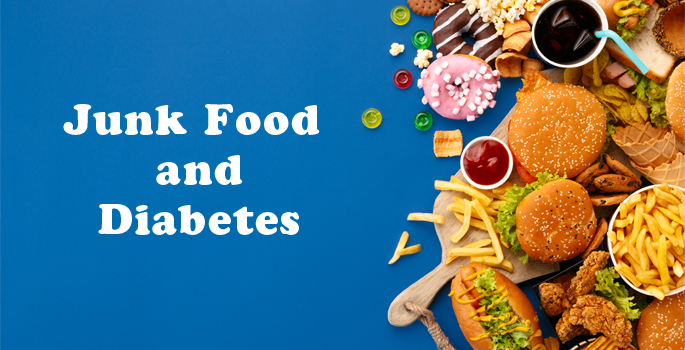When we talk about junk food and diabetes, we must first understand what junk food is. Andrew F Smith, in his book Encyclopedia of Junk Food and Fast Food defined junk food as those commercial products including candies, bakery goods, icecreams, salty snacks and soft drinks which have little or no nutritional value, but do have plenty of calories, salts and fats. While not all fast foods are junk foods, most of them are. Ministry of Health and Family Welfare conducted a survey which showed 16% of children in the age group of 10 – 16 years have high levels of blood sugar. It also showed that 10% of children in the age group of 5 – 9 years are prediabetic. This clearly indicates that changing lifestyle options are a major factor in increasing the risk of diabetes among individuals.
Increased consumption of junk food and refined food, decreased activity and increased free time has led to this. Earlier children used to walk to school or use bicycles which they don’t do now. Irregular meal timings also cause problems in metabolic activity which contributes to bad health. Intake of high fat and processed food, high in carbohydrates adds to this problem. Stress and puberty hormones lead to insulin resistance. Obesity is another major factor that triggers diabetes. Adulteration of food with pesticides and chemicals used in vegetables and fruits adds to this.
To understand the relationship between junk food and the onset of diabetes, one must understand the normal glucose metabolism that happens in the body. The body needs insulin to regulate levels of sugar in the blood and to use this sugar to fuel the body cells. Without insulin, the body cannot process glucose, which comes from carbohydrates in the diet. When glucose collects in high levels in the blood over time, it can damage the body’s organs as the blood circulates. In addition, the body cells will not have enough energy because without insulin, glucose cannot enter the cells.
Now we must understand how junk foods can alter the normal glucose metabolism and cause diabetes. Junk foods usually have a rapid effect on blood sugar levels. Highly processed foods that are high in calories and low in vitamins, minerals and fibre break down quickly in the body and can cause a rapid rise in blood sugar levels. Junk foods lack nutrients, vitamins and minerals and are high in energy, salts, sugars and fat. The commonest junk foods consumed in our society are chocolates and sweets, fast foods such as burgers and pizzas. Processed meat such as bacon and sausages, cakes and pastries, chips and wafers, etc.
Eating junk foods regularly can lead to various long term chronic illnesses such as diabetes mellitus, non-alcoholic fatty liver, cardiovascular diseases, various malignancies, hypertension, oestioposis, lipid disorders, obesity etc. The short term effect of eating junk food include fatigue, sleep disorders, increased stress levels, feeling low and tooth decays, etc.
Diets that are high in sugar and fat can suppress the activity of the brain peptide called BDNF – Brain-Derived Neurotrophic Factor, which helps with learning and memory formation. Eating too many calories can interfere with the healthy production and functioning of synapsis, which is responsible for learning and memory. Excess consumption of trans-fat found in fried and processed foods can send mixed signals to the brain which makes it difficult to process what you have eaten and how hungry you are. This is probably, or most of them end up overeating. Eating a sugary snack may temporarily spike a blood sugar level making you feel happy and satisfied, but as soon as they return to normal, you are left feeling all the more irritable. Some people have the habit of late-night eating. Late-night snacks add extra calories which can lead to weight gain. If you snack after your evening meal, especially eat foods with carbohydrates, you may wake up the next morning with a high blood sugar level. So if you are feeling hungry at night after your dinner, your best choice would be a low carbohydrate, low-calorie snack preferably one that is high in protein or fibre.
It is a big challenge to reduce the intake of junk foods once you are used to them. Instead, you can create a healthy eating habit by choosing whole food options such as wholemeal and whole-grain carbohydrates like pasta, bread and flour. By planning your meal ahead of time, so you decide what you eat based on nutrition and not based on what is available. Always choose fresh fruit for a dessert. Check your food’s nutritional value based on information available on the packet. Choose a healthy packed one based on the health star rating system.
Now the commonly asked question is – can eating a lot of sugar make you diabetic? The belief that there is a direct link between eating sugar and developing diabetes is a myth. It is more being overweight, particularly around the waist that is linked with Type 2 diabetes, than any particular food you eat.

